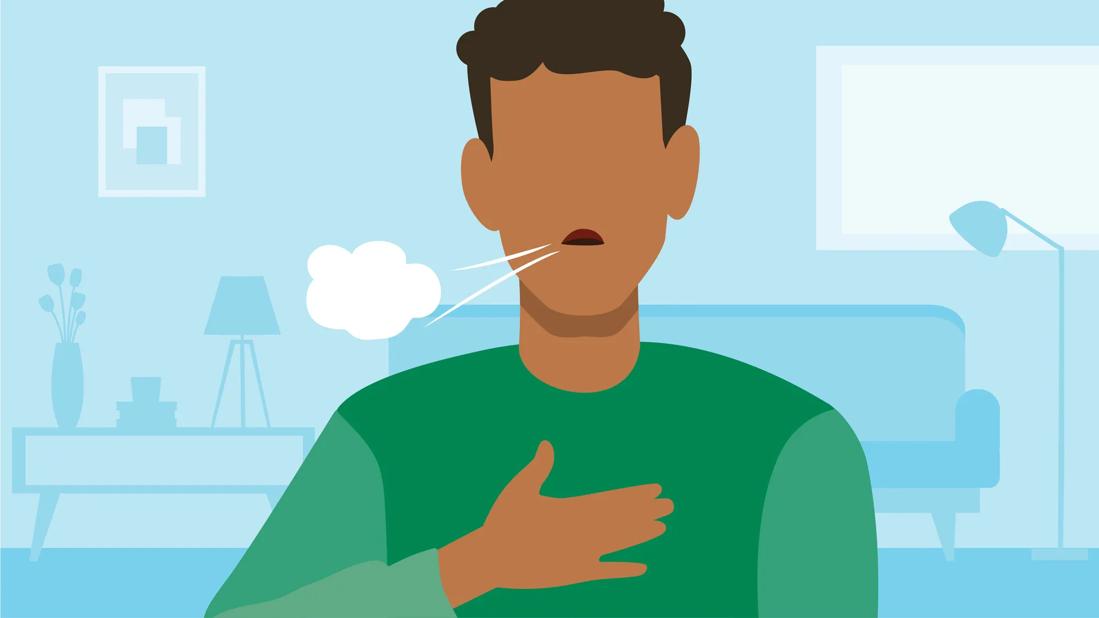Simple at-home solutions, like doing pursed lip breathing and drinking a warm beverage, can often bring immediate relief

Image content: This image is available to view online.
View image online (https://assets.clevelandclinic.org/transform/0d8702cc-ee3f-418f-b389-997fc5e8e293/man-wheezing-trouble-breathing-2034398527)
Man with hand on chest, wheezing
Breathing is usually a quiet experience. But you may sometimes hear something extra, like a high-pitched whistle or deep rattling noise, as the simple act of inhaling and exhaling grows more difficult.
Advertisement
Cleveland Clinic is a non-profit academic medical center. Advertising on our site helps support our mission. We do not endorse non-Cleveland Clinic products or services. Policy
This wheezing is caused by inflammation and a tightening of your airways — and it can be alarming, to say the least.
So, what can you do to get air flowing freely through your lungs again? Let’s find out from pulmonologist Neha Solanki, MD.
Your plan of attack to halt wheezing depends in part on its underlying cause. Allergies and asthma are common triggers. Ditto for various illnesses and infections that gunk up your airways with mucus. (Yuck, right?)
Here’s what you can try in certain situations to put a stop to your wheezing.
A cold or general case of the crud can ramp up mucus production and leave your airways less than clear. Mucus-related wheezing often sounds deeper, like a snore, when you breathe in and out.
“In that case, drinking warm fluids [like warm tea] can help thin out mucus and loosen it up so it can move out of your airways,” says Dr. Solanki.
Breathing in steamy air from a warm shower or bath works to break up mucus that has settled in your chest. (It’s the same basic concept as drinking warm fluids.)
“Mucus can thicken and harden in your airways, which can make it difficult for air to get through and will lead to the wheezing you hear,” explains Dr. Solanki. “If you’re able to thin out that mucus, you breathe easier.”
Advertisement
Using a humidifier can help address wheezing in a few ways. Breathing in moist air can:
It’s best to keep indoor humidity levels between 30% and 50%, advises Dr. Solanki.
A technique known as pursed lip breathing — which calls for taking slow and deliberate breaths — may help you relax tightened airways that may be causing your wheezing. (This is ideal if your wheezing is related to asthma, but it can also be used in any circumstance.)
To do pursed lip breathing:
“What you’re doing is increasing the amount of time the air in your lungs has to exit,” explains Dr. Solanki. “By slowing down the process, you can help your lungs and regain control of your breathing.”
Allergens and irritants in the air can lead to the sort of airway inflammation that brings on wheezing, says Dr. Solanki. Triggers could include:
Distancing yourself from allergens and irritants that bring on wheezing may reduce your symptoms or keep them from escalating.
Avoiding and managing your triggers, particularly if you have asthma or allergies, can limit your risk of sudden breathing issues. Using an air purifier indoors may help reduce exposure to household allergens.
Prompt use of an inhaler when asthma-related wheezing begins can expand narrowed airways. Wheezing related to asthma usually comes with a high-pitched sound that may sound like a whistle.
“Don’t wait too long,” urges Dr. Solanki. (Even better, take action before you start wheezing if you begin to experience breathing issues.)
Antihistamines or other allergy medications may help reduce airway inflammation related to allergies. Over-the-counter cold medications may help relieve congestion that could be behind your wheezing, too.
Any of the above at-home remedies and tips should offer some quick relief from mild wheezing, sometimes within 10 to 15 minutes, says Dr. Solanki. Wheezing often just fades away on its own, too.
Advertisement
But sometimes, wheezing may be a sign of a larger issue that needs medical attention. Dr. Solanki recommends seeing a healthcare provider if:
Chronic (or regular) wheezing that comes and goes also shouldn’t be ignored.
“If inflammation is left untreated, it can become persistent inflammation and eventually lead to scarring,” cautions Dr. Solanki. “Get checked out and find out what the underlying issue is. It’s very important to take care of your lung health.”
Advertisement

Sign up for our Health Essentials emails for expert guidance on nutrition, fitness, sleep, skin care and more.
Learn more about our editorial process.
Advertisement
Changing how you breathe, gargling water and distracting yourself are all common ways to stop your diaphragm from spasming
Mouth taping may seem promising, but it can actually cause more harm than good, especially if you snore or have sleep apnea
When something like food or drink goes down your windpipe rather than your esophagus, it can cause coughing and sometimes choking
If you’re feeling short of breath, sleep can be tough — propping yourself up or sleeping on your side may help
Getting vaccinated in October can help protect you against severe illness between November and March
Breathing through your nose is far better for you, but depending on your anatomy, that may not always be possible
Cut up foods into small pieces and make sure you sit down and focus during meals
One theory is brain temperature regulation, and yes, a ‘contagious yawn’ is a real thing
Although it could be used as a moisturizer, this new trend is not recommended
Communicating clear limits helps protect your time, energy and emotional well-being
High cholesterol can be genetic, but testing and treatment can lower your heart disease risk